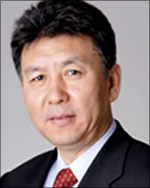 Last year, the information technology outsourcing market in China grew by 25 per cent to reach $25 billion in revenues, according to official statistics.
Last year, the information technology outsourcing market in China grew by 25 per cent to reach $25 billion in revenues, according to official statistics.
Although still behind India's $60 billion-equivalent, many Chinese companies are increasingly confident that India's days as king of software outsourcing are numbered. Business Standard spoke to Dr Liu Jiren, founder and CEO of Neusoft, China's largest outsourcing company, about how Chinese outsourcing firms evaluate themselves against Indian counterparts. Edited excerpts:
Can you tell us about Neusoft's journey?
I founded Neusoft in 1991 with a three-person team in a classroom in North Eastern University, where I was a professor at the time. Today, Neusoft is a $600-million company that employs 17,000 people.
We are different from Indian companies because they are focused on exports rather than their domestic market. But, for us, the Chinese domestic market is the main focus still and a big opportunity even in the long term, since the consumption of IT will only keep increasing there (in China).
Seventy per cent of our revenues currently come from within China and only 30 per cent from abroad. The main focus is Japan; we also have significant operations in Europe. In the US, we have only 30 people, working on mobile phone software.
How do your competitive strengths compare to Indian companies?
Unlike Indian companies, we don't do everything in our overseas market for software services. We are focused on product engineering. For example, we develop software for the automotive sector. We have 1,500 people working on this, as well as on mobile phones and health care instruments.
Most of these products are manufactured on a large scale in China. So, it makes sense to position ourselves like this, by integrating the core competency of China with global demand for software services.
Indian companies do a great job in communication because of their language skills and cultural advantages in doing business with the West. So, they are good at projects in the finance and insurance sectors, in consulting, and also BPO (business process outsourcing) work.
Chinese English-language skills are not so good. But, if we focus on product engineering, we can compete with Indian firms, since the core companies in these sectors are manufacturing in China.
Also, Chinese engineering graduates' technical English relating to engineering and hardware is perfect. So, language is also not a barrier here. Our talent pool understands both hardware and software, so we can blend these. It's better for clients to purchase hardware and software in the same place at the same time.
Moreover, many Chinese companies are now going global and that will give us more opportunities
The outlook for the Chinese domestic software market is bullish, pegged at 40-45 per cent growth annually. Do you share this view?
There will be very fast growth of the outsourcing business in China. More and more companies are moving towards only keeping their IT planning in-house and outsourcing everything else.
China Mobile, China Telecom are both going down this road. So is China Power.
The government in China now almost outsources 100 per cent of its IT needs. This is a big change for an entity that used to be very conservative and keep everything inside itself.
What about the outlook for growth in your exports?
Over the next five years, we hope that software exports constitute 50 per cent of our revenue. We can do it because one big change from five years ago is the talent pool.
Earlier, Chinese who went abroad to study, stayed abroad. Now they return to China to find jobs. These people speak good English and are well educated.
What are the primary challenges you need to overcome to meet your goals?
The basic challenge is how to take our domestic success overseas. How to bypass cultural barriers. China was closed to the outside world for a long time and it is still not easy for us to understand the overseas market and culture.
What percentage of your employee base comprises foreign nationals?
Seven per cent, but we aim to increase this to 20 per cent over the next 10 years. This will help us to understand different political cultures, different mentalities and different business models, which we need to be able to understand if we are to expand our overseas business.